-
Farm/Coop
-
Ela Tenacha
-
Country
- Ethiopia
-
Region
-
Yirgacheffe
-
Altitude
-
2100m above sea level
-
Variety
-
Process
-
Harvested
-
November 2023
-
Country grade
-
Grade 1 (Ethiopia)
-
Importer
-
Condesa Co Lab
-
Body
-
-
Acidity
-
-
Tasting notes
-
Peach, black tea, apricot
-
Roast style
Ethiopia
Ela Tenecha
Grown in an area renowned for it’s exceptional coffee, cultivated in the rich, fertile soils and nurtured by the gentle rains of the Yirgacheffe county hills. This coffee from Ela washing station has notes of peach, black tea, apricot.
Story and history written by Getu Bekele
In the heart of Ethiopia, nestled within the verdant hills of Yirgacheffe county, lay the village of Ela Tenecha. This area is renowned for their exceptional coffee, cultivated in the rich, fertile soils and nurtured by the gentle rains. Among the winding paths and terraced fields of coffee trees, two boys, Ashebir and Ashenafi, grew up side by side, their laughter and friendship intertwined with the rhythm of the coffee seasons. From a young age, Ashebir and Ashenaf were inseparable. They spent their days playing among the coffee trees, their afternoons filled with the scent of ripening cherries and the hum of insects. Their families were farmers, deeply rooted in the coffee culture that had sustained their community for generations. As they grew, so did their understanding and appreciation of the delicate process that transformed coffee cherries into the beloved beverage enjoyed around the world.
The years passed, and the boys became men. Ashenafi, with his keen eye for detail and love for machinery, found work in a nearby town, learning the intricacies of coffee processing equipment. Ashebir, with his natural leadership and deep connection to the land, stayed in the village, managing his family’s farm and fostering relationships with local farmers. And, he has been also actively involved in coffee supplying (Akrabi) trade. Despite their different paths, their bond remained strong, and they often dreamed of a way to give back to their community and elevate the quality of their beloved Yirgacheffe coffee.
In early 2021, as the world grappled with change and uncertainty, Ashebir and Ashenafi saw an opportunity. With their combined skills and deep-rooted passion, they decided to establish a coffee washing station in Ela Tenecha. The station would not only process the coffee cherries but also ensure that the farmers received fair compensation for their hard work, fostering a sustainable and prosperous future for their community. They named their venture the Ela Tenecha Coffee washing station, honoring the village that contributed to their shared dream. Ashenafi’s experience with machinery and processing proved invaluable as he set up the washing station, meticulously calibrating the equipment to handle the delicate Kurume coffee cherries that were so prized in the region. Ashebir, with his extensive network and understanding of the local farming community, reached out to farmers in Ela and Bowicha, convincing them of the benefits of bringing their red cherries to the new washing station.
By November, as the coffee harvest began, the washing station was ready. The air buzzed with excitement and anticipation as the first deliveries of ripe, red cherries arrived. Ashebir and Ashenafi worked tirelessly, overseeing the sorting, pulping, and fermentation processes. They ensured that each batch of coffee was handled with the utmost care, preserving the unique flavors and characteristics of the Kurume variety.
Farmers from Ela and Bowicha villages marveled at the transformation. The washing station allowed them to produce higher quality coffee, fetching better prices in the market. As the harvest season stretched from November to January, the washing station became a bustling hub of activity, drawing together the community in a shared purpose. They became acquainted with G Broad, a specialty coffee exporting company that works closely with smallholder coffee farmers in the area, and initiated promising discussions about producing high-quality coffees for the international market. Through G Broad, Condesa discovered Ela Washing Station and sampled their excellent coffees. This marks Condesa’s second year purchasing from this washing station.
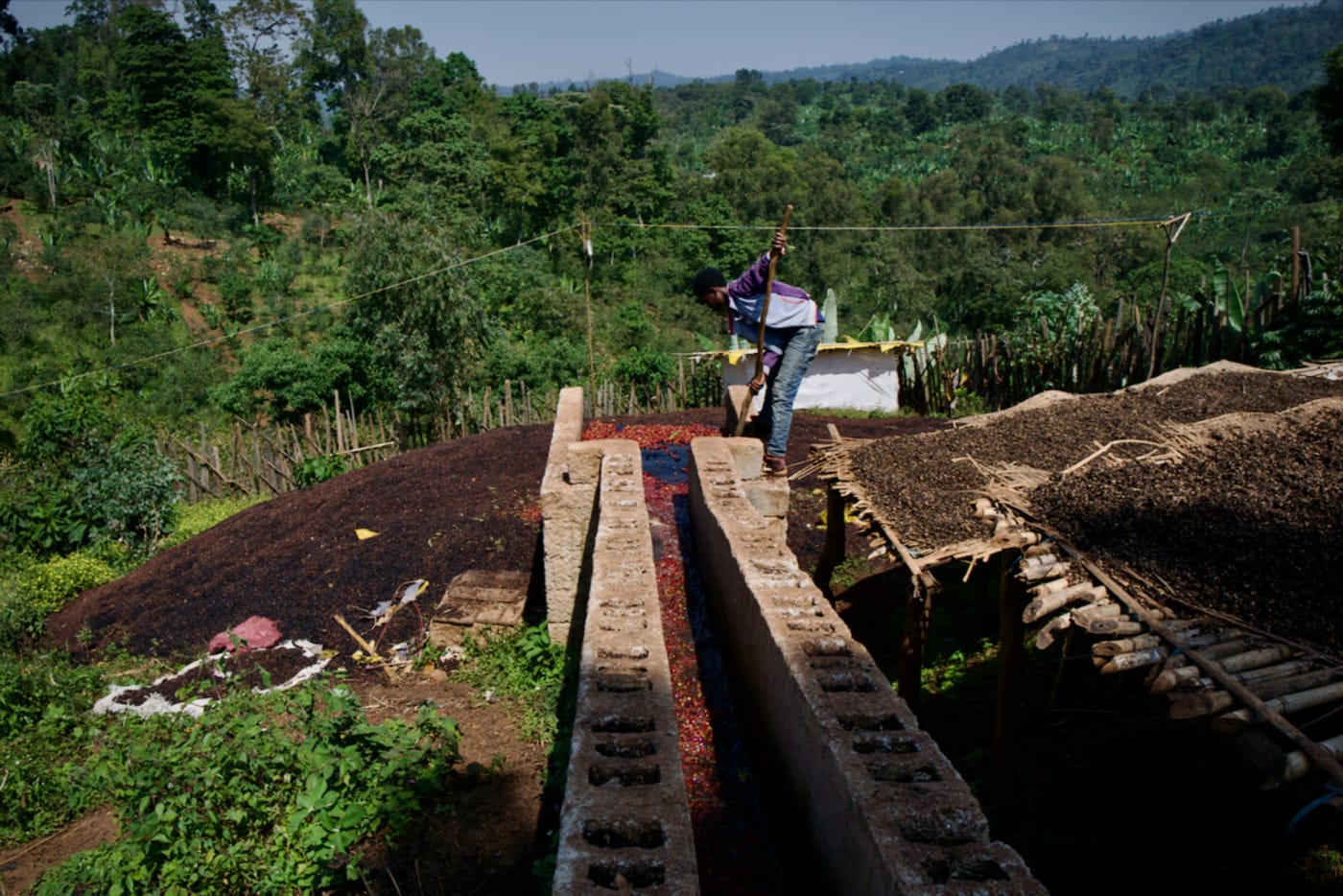
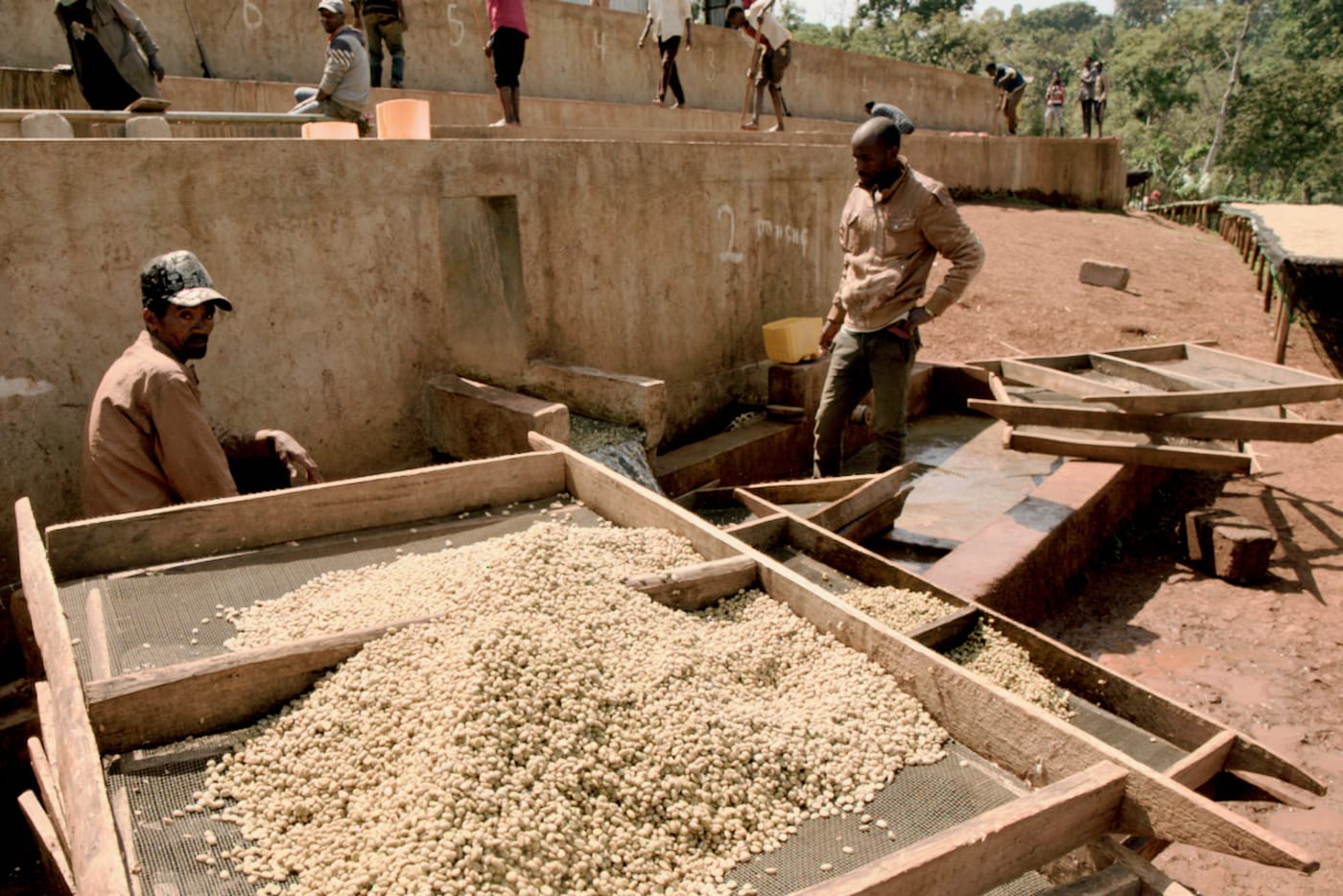
Coffee processing
Hand-picked coffee cherries undergo sorting to remove unripe, lighter, overripe, and insect/pest-damaged cherries, leaving only well-ripened red cherries for pulping. A locally made coffee processing machine called Agard is used for pulping. Immediately after pulping, the coffee is soaked in water for 60-72 hours to undergo wet fermentation. The fermentation time changes based on the daily atmospheric temperature level. The water is changed every 24 hours during this period. The fermentation round is complete when the mucilage is entirely removed, confirmed by washing the parchment coffee with clean water.
Clean parchment coffee is then briefly soaked in a soaking tank for 2 to 4 hours before being transferred to a skin-drying stage, where it is spread out by hand under shade. This process typically lasts for 2 to 4 hours in the morning. The skin drying stage is followed by the final main drying stage. In this phase, the parchment coffee is transferred to a raised drying bed and remains there for 10 days until the bean moisture level reaches 10.0-10.5%. To maintain uniform drying among beans, the parchment coffee is set under the sun for two hours in the morning between 8:30 and 11:00AM. To protect the parchment coffee from the hottest hours of the day, it is covered with nylon mesh and plastic between 11:30 AM and 3:00 PM. In the afternoon, the parchment coffee is uncovered for another two hours between 3:00 PM and 5:00 PM. This routine is carried out throughout the main parchment coffee drying period.
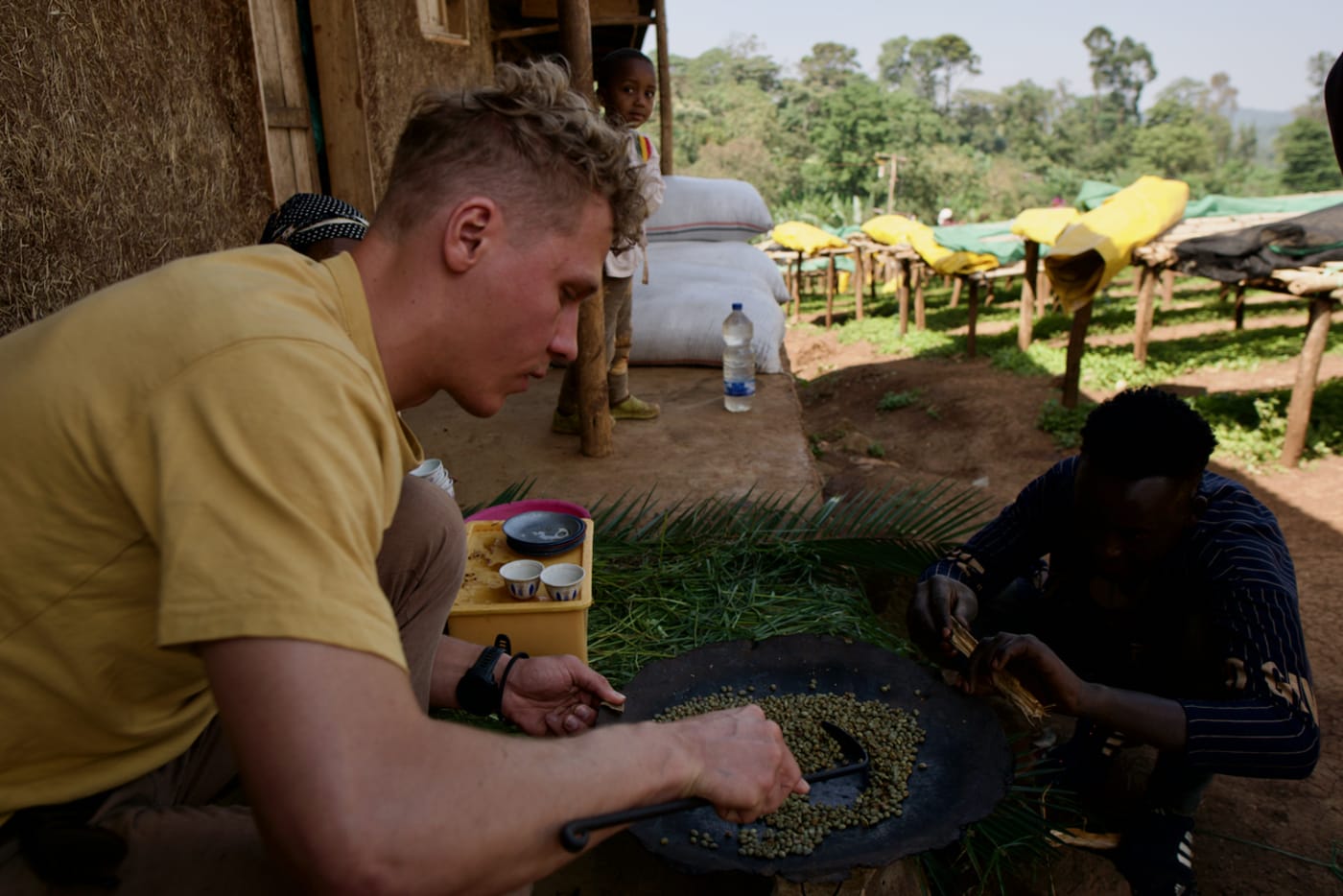
Learn everything about this coffee:
Ethical, traceable sourcing
This page has all the sourcing information (variety, process, region, story, importer, and more) that our importers share with us, and give us permission to use.
The transparency helps us talk confidently about the quality and background of our product, and it helps you know exactly what you’re buying.
Learn more:
Coffee page transparency legend
Our coffee philosophy
Our business approach
Fresh harvest coffee
We only source and roast coffee from each country’s latest harvest season (so the green coffee is never older than 1 year from the time of picking, processing and packing). This ensures the sensory qualities are always at their peak and unaffected by excessive ageing.
Roasted for espresso and filter (best enjoyed black)
Roast style: omni. Omni roasts are designed to brew and taste great both as espresso and filter. Our omni single origins generally sit on Agtron values in the ~70-60 value range. So, technically, they are somewhere in the lighter side of the medium spectrum.
Designed for espresso and filter brewing. Best enjoyed black.
Learn more:
Our Loring Kestrel S35 roaster
Our roasting style and approach
Best brewed within days 15-49 post-roast
The ‘fresh is best’ saying doesn’t apply to coffee (contrary to popular belief). Waiting before opening and brewing your bag of whole coffee beans helps develop peak flavour and acidity.
But heads up: if you buy pre-ground coffee, brew it as soon as possible.
Learn more:
Our recommended brewing window
Try our custom brewing recipes
Our recipes and ratios are tailored to our coffee sourcing and roasting styles, bringing the best flavour and feel out of each coffee.
For pour over, immersion, and other filter brewing styles, check our brew guides.
For our espresso single origins, we recommend a coffee:yield ratio of 1:3:
- Dose: 20g ground coffee
- Yield: 60g espresso
- Total brew time: ~24-28 seconds
This is just a starting point! We encourage you to experiment, taste, and adjust to find the recipe that you enjoy the most.
Learn more:
Our espresso brew guide (single origin)
Brewing ratio calculator
Packaging and sustainability
- Bags: ABA-certified home compostable (AS 5810-2010)
- Labels: recyclable
- Valves (only on +250g bags): general waste
- Box and tape (online orders): recyclable
Learn more:
Our packaging
Variety
Kurume variety
An Ethiopian sub-varietal that falls under the umbrella of Heirloom/landrace category, called as such in the Yirgacheffe area but referred to as Kudhum in Guji.
The location
Coffee from Ethiopia
Seen as the birthplace of domesticated coffee, there are not many more exciting times at the Sample warehouse as when our fresh Ethiopian lots arrive. Legend says it’s our favourite origin…
The Yirgacheffe region of Ethiopia
Unique for its floral and highly aromatic coffees. Some our of very favourite and memorable Ethiopian coffees have emerged from this legendary region.
Farm processes
Washed process
Machines are used to remove the flesh from the coffee cherry before being fermented in water, washed again, and finally sun dried. This process tends to result in more distinct, cleaner flavours.

Subscribe to a world of coffee
Discover a new single origin coffee from Sample every 1-5 weeks with no delivery fees.
No up-front purchase, and you can pause, cancel, or change plans at any time.
Available to order online this week:
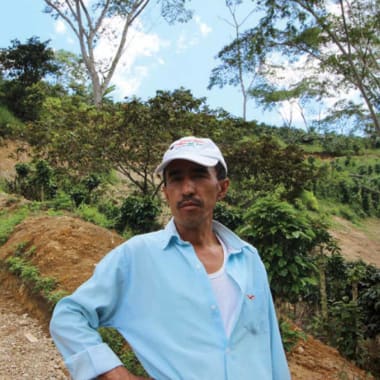
Colombia Jose Elcias Martinez Guzman Pink Bourbon
Flavours of mandarin, burnt orange, pineapple
Body Acidity
Washed Pink Bourbon
December 2024 harvest
Roasted omni for filter and espresso
Colombia Jose Elcias Martinez Guzman Pink Bourbon online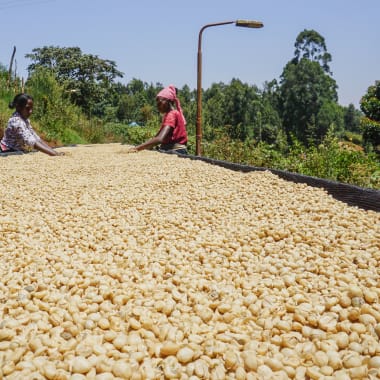
Kenya Karindundu Aa
Flavours of orange marmalade, grapefruit, Yunnan red tea
Body Acidity
Washed Batian, SL28, SL34, Ruiru 11
Roasted omni for filter and espresso
Kenya Karindundu Aa online
Ethiopia Bekele Gemeda
Flavours of mandarin, white peach, mango
Body Acidity
Washed Ethiopian Heirloom
November 2024 harvest
Roasted omni for filter and espresso
Ethiopia Bekele Gemeda online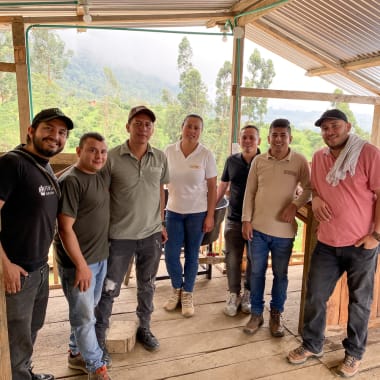
Colombia Adriana Díaz
Flavours of lemongrass, black tea, bergamot
Body Acidity
Anaerobic washed Gesha
Roasted omni for filter and espresso
Colombia Adriana Díaz online